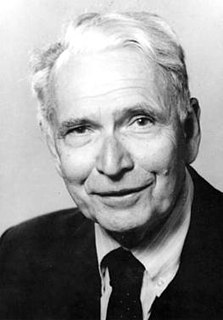A Quote by George H. W. Bush
Never answer a hypothetical question. It gets you beyond where you want to be.
Related Quotes
We cannot discuss the state of our minorities until we first have some sense of what we are, who we are, what our goals are, and what we take life to be. The question is not what we can do now for the hypothetical Mexican, the hypothetical Negro. The question is what we really want out of life, for ourselves, what we think is real.
I have often had cause to feel that my hands are cleverer than my head. That is a crude way of characterizing the dialectics of experimentation. When it is going well, it is like a quiet conversation with Nature. One asks a question and gets an answer, then one asks the next question and gets the next answer. An experiment is a device to make Nature speak intelligibly. After that, one only has to listen.
To be a scientist you have to be willing to live with uncertainty for a long time. Research scientists begin with a question and they take a decade or two to find an answer. Then the answer they get may not even answer the question they thought it would. You have to have a supple enough mind to be open to the possibility that the answer sometimes precedes the question itself.
A dialogue is very important. It is a form of communication in which question and answer continue till a question is left without an answer. Thus the question is suspended between the two persons involved in this answer and question. It is like a bud with untouched blossoms . . . If the question is left totally untouched by thought, it then has its own answer because the questioner and answerer, as persons, have disappeared. This is a form of dialogue in which investigation reaches a certain point of intensity and depth, which then has a quality that thought can never reach.
I never buy anything unless I can fill out on a piece of paper my reasons. I may be wrong, but I would know the answer to that ...I'm paying $32 billion today for the Coca Cola Company because... If you can't answer that question, you shouldn't buy it. If you can answer that question, and you do it a few times, you'll make a lot of money.
We can each sit and wait to die, from the very day of our births. Those of us who do not do so, choose to ask - and to answer - the two questions that define every conscious creature: What do I want? and What will I do to get it? Which are, finally, only one question: What is my will? Caine teaches us that the answer is always found within our own experience; our lives provide the structure of the question, and a properly phrased question contains its own answer.
The best parenting advice I ever got was from a labor nurse who told me the following: 1. After your baby gets here, the dog will just be a dog. 2. The terrible twos last through age three. 3. Never ask your child an open-ended question, such as "Do you want to go to bed now?" You won't want to hear the answer, believe me. "Do you want me to carry you upstairs, or do you want to walk upstairs to go to bed?" That way, you get the outcome you want and they feel empowered.


































